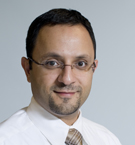29 Oct Formal Guidelines May Improve Resident-Attending Communication in Hospital
MedicalResearch.com Interview with:
Chadi El Saleeby, MD. MS.
Assistant Professor of Pediatrics, Harvard Medical School
Pediatric Hospital Medicine and
Pediatric Infectious Disease Units
Mass. General Hospital for Children
Boston, MA 02114
Medical Research: What is the background for this study? What are the main findings?
Dr. El Saleeby: The Institute of Medicine, the Accreditation Council of Graduate Medical Education, and the American Board of Pediatrics stress the importance of appropriate supervision of trainees to reduce errors, lower patient mortality, and improve quality of care. However, how appropriate supervision should be implemented in clinical practice is not well defined. After-hours supervision can be especially difficult when attendings or fellows may not be immediately available on-site and residents must determine when to contact a supervising physician regarding a clinical issue.
The purpose of this study was to evaluate expectations when a pediatric resident should a contact a supervising physician while working after hours. To that effect, we developed 34 scenarios of the most common or the most serious issues encountered by residents on a general pediatric floor. We included these scenarios in an online survey, which was sent to the residents, fellows and attendings, asking for each scenario, if they would communicate immediately to discuss, or delay communication until the following day.
There were two main findings of the study.
First, in half of the scenarios, there were significant differences in communication preferences between residents and their supervisors. In all of these 17 discrepant scenarios without one single exception, more supervising clinicians wanted immediate communication compared to the residents.
Second, there was no internal agreement between supervising physicians themselves. The junior attendings were more similar in their responses to residents while the more senior group (attendings with 5 or more years of clinical experience) asked to be immediately contacted much more frequently.
Medical Research: What should clinicians and patients take away from your report?
Dr. El Saleeby: We found significant discrepancies in communication preferences between residents and supervising physicians but also amongst supervising physicians themselves. These differences create a lot of confusion for residents at an already difficult time in their careers, as well as opportunities for medical errors and delivery of suboptimal care.
In our opinion and as outlined in the report, a large part of the answer is to remove the guesswork and provide the residents with formal institutional guidelines for communication. These guidelines should be clear, concise, specific and readily available to the residents whenever and wherever they are in the hospital. Developing and appropriately disseminating such guidelines could help frame communication within health-care institutions with training programs, improve educational opportunities, and guide residents in their clinical work.
Medical Research: What recommendations do you have for future research as a result of this study?
Dr. El Saleeby: Further understanding of how the discrepancies unveiled in this report and/or the institution of formal communication guidelines affect actual physician attitudes, and subsequent patient care and resident training should be areas of future investigation.
Citation:
Deepak Palakshappa, Lindsay P. Carter, Chadi M. El Saleeby.
Discrepancies in After-Hours Communication Attitudes between Pediatric Residents and Supervising Physicians. The Journal of Pediatrics, 2015; DOI: 10.1016/j.jpeds.2015.08.052
[wysija_form id=”5″]
Chadi El Saleeby, MD. MS. (2015). Formal Guidelines May Improve Resident-Attending Communication in Hospital
Last Updated on October 29, 2015 by Marie Benz MD FAAD

